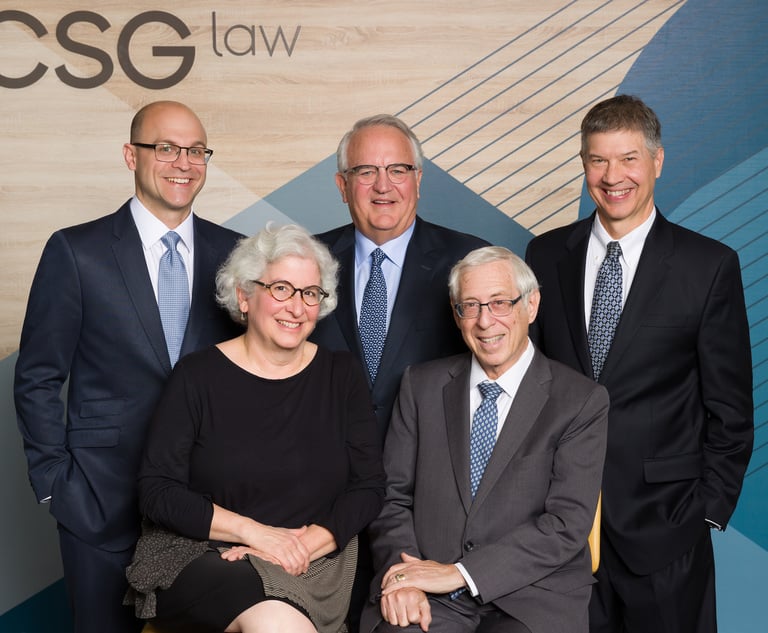 Bigstock
BigstockGC Compensation: 'Working Really, Really Hard,' and Getting Paid Well
Compensation for top lawyers at New Jersey-based publicly held companies remains strong. And while gender diversity among this exclusive group hasn't changed much year to year, there are more women at the top of the compensation list than in years past.
August 30, 2019 at 10:40 AM
7 minute read
Compensation for top lawyers at New Jersey-based publicly held companies remains strong. And while gender diversity among this exclusive group hasn't changed much year to year, there are more women at the top of the compensation list than in years past.
There was something of a change in the data: average salary, after five straight years of upward movement—yielding growth of about 20% over that five-year period—essentially flattened out. The average salary on this year's list is $446,758, compared with $448,945 on last year's.
The group, of course, changes each year. The data is gathered from fiscal 2018 federal securities filings by ALM Legal Intelligence, the affiliate data unit for the Law Journal and all ALM publications, and this year its survey of the documents turned up 27 general counsel for New Jersey-based public companies. Last year, the Law Journal listed 20 GCs. And there is turnover every year—so it's worth noting that year-over-year comparisons aren't perfect for this annual project.
Despite the blip in average salary, median salary was again on the rise: the $434,158 figure represents a 2.8% increase.
And like every year, there were some impressive compensation figures, particularly for those New Jersey GCs who cashed in on stocks and options holdings.
Attorneys and consultants have said that the steady rise in pay for general counsel, as well as others in corporate legal departments, is due in large part to those lawyers' expanded roles and functions.
 Lee Udelsman/courtesy photo
Lee Udelsman/courtesy photo
"The legal function has sort of been elevated in its stature in the organization," said Lee Udelsman, managing partner of Major, Lindsey & Africa's New Jersey office, who places in-house counsel. "In-house lawyers are working really, really hard."
In eras past, the trade-off of going from law firm to in-house went like this: fewer paths to exceptional income, but more predictability in work hours and other day-to-day functions. But, "I think the paradigm has shifted," Udelsman said—noting, as an example, that in-house lawyers are quarterbacking M&A transactions themselves and then "can't exhale" when the deals are done because they're tasked with integrating the merged companies. And many in-house lawyers are overseeing global corporations, so they are looped in on matters at all hours.
"It's not like you're going home at 5:00 and 5:30," Udelsman said.
The level of demand for candidates also helps drive compensation. It's a "very light labor market, specifically as it relates to lawyers" and a "candidate-driven market at this juncture," he said. It's "taking a little longer for us to fill roles," he added.
In the case of the 27 GCs on this year's list, hard work pays off.
In addition to salaries ranging from $277,731 to $700,000, there also are discretionary bonuses and nonequity incentive compensation (which are incentive bonuses tied to company performance). Each GC on the list except one got at least one type of bonus. Four of them got both. The largest bonus of either type was a $1.05 million discretionary bonus paid to Samrat Khichi of Franklin Lakes-based Becton, Dickinson and Co. (who, in addition, got a $371,250 incentive bonus).
For each GC, salary plus bonus plus nonequity incentive compensation makes up total cash—the metric by which the GCs are ranked. For example, Khichi's bonuses, plus his $450,000 salary, amounted to $1.87 million in total cash, which ranked him No. 2 on the list.
But, as is the case every year, the key to exceptionally big earnings was cashing in stock and options holdings. For the second year in a row, Kenneth Thompson of Jersey City-based Verisk Analytics led in this category. In addition to his $846,800 in total cash, he realized $31.23 million in value on stock vesting and options exercises, for a total take-home figure of more than $32 million. Total take-home pay on last year's list was $11.76 million for Thompson, a former McCarter & English partner who has been Verisk's GC since 2006, according to the company's proxy statement.
Of the 27 GCs on the list, 17 had total take-home pay of greater than $1 million, and five of them had total take-home pay of greater than $2 million.
There were also stock and options awards. All but one GC on the list got at least one. The largest was a $3.03 million stock award to Brad Turner of Newell Brands of Hoboken.
|'Just the tip of the iceberg'
Gender diversity among the ranked GCs in New Jersey hasn't moved much. About one-quarter of this year's list is made up of women. Women have made up 23% to 30% of the list in recent years.
One difference, though, is the fact that this year's list is topped by a woman: Jennifer Zachary of Kenilworth-based Merck & Co. Her $553,846 in salary, $750,000 bonus and $683,400 in nonequity incentive compensation made up $1.94 million in total cash.
Women also occupy the No. 4 spot (Tamara Linde of Newark-based Public Service Enterprise Group, $1.17 million in total cash) and the No. 8 spot (Samantha Hanley of Cambrex Corp. of East Rutherford, $905,870 in total cash).
Of course, numbers, whether it's compensation or head count, don't mean everything, according to Tommy Shi, the Parsippany-based director of diversity and inclusion at Day Pitney. Shi, a former in-house counsel and 10-year diversity and inclusion officer for Mercedes-Benz USA, now has seen the diversity issue from both the in-house and outside-counsel lens since his move to Day Pitney a year ago.
"Increasingly, clients are really asking for more data … really diving deep into the law firms they use," said Shi, who participates in client requests for proposal, many of which ask for the bidding law firms' diversity metrics. But numbers "are just the tip of the iceberg" for any organization, while the culture and processes are most important, he said.
"The question is, what do they [the clients] do with those numbers?" Shi said, adding that law firms would benefit from "a two-way street" where clients explain how they're evaluating law firms' diversity metrics, as well as feed back: "here's how we think you should improve."
"The more we discuss D&I, it's a positive thing," Shi said.
Udelsman said corporations have focused on the GC role to "inject diversity into the C-suite."
"We live in a period of time when there's a much higher level of social consciousness for corporations," who are looking into whether their employee roster can "more closely resemble the makeup of the workforce," he said.
Hiring certainly is part of that process. And legal departments will be hiring. Udelsman said he sees no reason why the strategy of bringing more legal functions in-house, rather than paying outside counsel, should fall out of favor.
The "make-versus-buy analysis" is part of it, but there's also "a sense that the people in-house have a much better sense of what the company's risk tolerance is," and what its culture is, he said.
As in-house lawyers, "you get to know the people you're serving really well," Udelsman said.
This content has been archived. It is available through our partners, LexisNexis® and Bloomberg Law.
To view this content, please continue to their sites.
Not a Lexis Subscriber?
Subscribe Now
Not a Bloomberg Law Subscriber?
Subscribe Now
NOT FOR REPRINT
© 2024 ALM Global, LLC, All Rights Reserved. Request academic re-use from www.copyright.com. All other uses, submit a request to [email protected]. For more information visit Asset & Logo Licensing.
You Might Like
View All
Appellate Div. Follows Fed Reasoning on Recusal for Legislator-Turned-Judge
4 minute read
Chiesa Shahinian Bolsters Corporate Practice With 5 From Newark Boutique
5 minute read
'A Mockery' of Deposition Rules: Walgreens Wins Sanctions Dispute Over Corporate Witness Allegedly Unfamiliar With Company
Trending Stories
Who Got The Work
Michael G. Bongiorno, Andrew Scott Dulberg and Elizabeth E. Driscoll from Wilmer Cutler Pickering Hale and Dorr have stepped in to represent Symbotic Inc., an A.I.-enabled technology platform that focuses on increasing supply chain efficiency, and other defendants in a pending shareholder derivative lawsuit. The case, filed Oct. 2 in Massachusetts District Court by the Brown Law Firm on behalf of Stephen Austen, accuses certain officers and directors of misleading investors in regard to Symbotic's potential for margin growth by failing to disclose that the company was not equipped to timely deploy its systems or manage expenses through project delays. The case, assigned to U.S. District Judge Nathaniel M. Gorton, is 1:24-cv-12522, Austen v. Cohen et al.
Who Got The Work
Edmund Polubinski and Marie Killmond of Davis Polk & Wardwell have entered appearances for data platform software development company MongoDB and other defendants in a pending shareholder derivative lawsuit. The action, filed Oct. 7 in New York Southern District Court by the Brown Law Firm, accuses the company's directors and/or officers of falsely expressing confidence in the company’s restructuring of its sales incentive plan and downplaying the severity of decreases in its upfront commitments. The case is 1:24-cv-07594, Roy v. Ittycheria et al.
Who Got The Work
Amy O. Bruchs and Kurt F. Ellison of Michael Best & Friedrich have entered appearances for Epic Systems Corp. in a pending employment discrimination lawsuit. The suit was filed Sept. 7 in Wisconsin Western District Court by Levine Eisberner LLC and Siri & Glimstad on behalf of a project manager who claims that he was wrongfully terminated after applying for a religious exemption to the defendant's COVID-19 vaccine mandate. The case, assigned to U.S. Magistrate Judge Anita Marie Boor, is 3:24-cv-00630, Secker, Nathan v. Epic Systems Corporation.
Who Got The Work
David X. Sullivan, Thomas J. Finn and Gregory A. Hall from McCarter & English have entered appearances for Sunrun Installation Services in a pending civil rights lawsuit. The complaint was filed Sept. 4 in Connecticut District Court by attorney Robert M. Berke on behalf of former employee George Edward Steins, who was arrested and charged with employing an unregistered home improvement salesperson. The complaint alleges that had Sunrun informed the Connecticut Department of Consumer Protection that the plaintiff's employment had ended in 2017 and that he no longer held Sunrun's home improvement contractor license, he would not have been hit with charges, which were dismissed in May 2024. The case, assigned to U.S. District Judge Jeffrey A. Meyer, is 3:24-cv-01423, Steins v. Sunrun, Inc. et al.
Who Got The Work
Greenberg Traurig shareholder Joshua L. Raskin has entered an appearance for boohoo.com UK Ltd. in a pending patent infringement lawsuit. The suit, filed Sept. 3 in Texas Eastern District Court by Rozier Hardt McDonough on behalf of Alto Dynamics, asserts five patents related to an online shopping platform. The case, assigned to U.S. District Judge Rodney Gilstrap, is 2:24-cv-00719, Alto Dynamics, LLC v. boohoo.com UK Limited.
Featured Firms
Law Offices of Gary Martin Hays & Associates, P.C.
(470) 294-1674
Law Offices of Mark E. Salomone
(857) 444-6468
Smith & Hassler
(713) 739-1250







